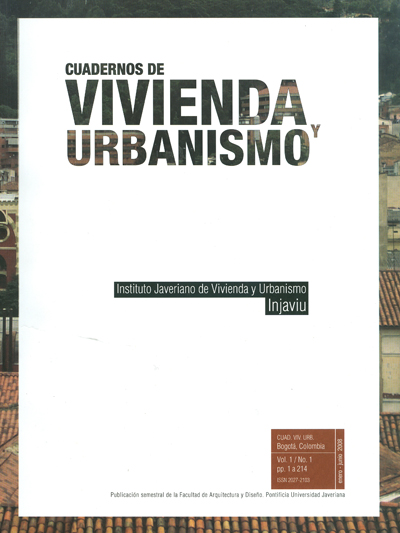Abstract
This reflection is the result of a Master’s degree investigation about the socio-spatial segregation in the eastern mountains of Bogotá. The text aims to present a critic discussion on the manner in which the environmental and the urban relate in a city like Bogotá, where land planning and the realities produced within, seem to move away between them each time further. The objective of this discussion is to demonstrate the appreciation of the ecological importance and environmental character of the Reserve; the urban structure of the city, where the predominant element of each position collides between conservation-preservation visions; the construction of urban conventions and normative interventions; and the generation of population inequalities. In order to achieve this, it was necessary to revise the public policy released for the mountains of Bogota, identifying its epistemological point of departure and its effects on the urban and environmental aspects of the eastern border of the city. The results are an approach to a comprehensive management proposal of the environmental policy in the urban context, especially related to the persistent conflict in the Protective Forest Reserve Eastern Woods of Bogota.
This journal is registered under a Creative Commons Attribution 4.0 International Public License. Thus, this work may be reproduced, distributed, and publicly shared in digital format, as long as the names of the authors and Pontificia Universidad Javeriana are acknowledged. Others are allowed to quote, adapt, transform, auto-archive, republish, and create based on this material, for any purpose (even commercial ones), provided the authorship is duly acknowledged, a link to the original work is provided, and it is specified if changes have been made. Pontificia Universidad Javeriana does not hold the rights of published works and the authors are solely responsible for the contents of their works; they keep the moral, intellectual, privacy, and publicity rights.
Approving the intervention of the work (review, copy-editing, translation, layout) and the following outreach, are granted through an use license and not through an assignment of rights. This means the journal and Pontificia Universidad Javeriana cannot be held responsible for any ethical malpractice by the authors. As a consequence of the protection granted by the use license, the journal is not required to publish recantations or modify information already published, unless the errata stems from the editorial management process. Publishing contents in this journal does not generate royalties for contributors.


